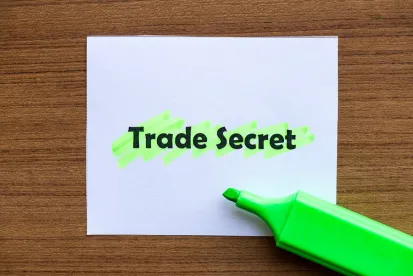In a recent decision from the U.S. District Court for the District of Florida, a healthcare product manufacturer’s claim of trade secret misappropriation against a competitor and a customer was thrown out on summary judgement. While the plaintiff showed that at least some defendants had access to the plaintiff’s alleged trade secret protected CBD cream formula and manufacturing process, the plaintiff failed to demonstrate that the defendants’ accused CBD cream product was manufactured using the alleged trade secret. Healthcare Res. Mgmt. Grp., LLC v. Econatura All Healthy World, LLC, No. 9:20-cv-81501-Matthewman, 2021 U.S. Dist. LEXIS 206871 (S.D. Fla. Oct. 27, 2021).
The plaintiff – Healthcare Resources Management Group, LLC (“HRMG”) – is a producer of pharmaceutical-grade hemp products that sells a topical cannabidiol (“CBD”) cream under its Pharmalieve brand and on a “white label” basis using alleged trade secrets. Id., at *4-6, 15. “White label” basis means that the plaintiff sells its product without its branding to a third party, and the third party puts its log on the product and sells the product. Id. at *6. HRMG entered into a manufacturing arrangement with Econatura All Healthy World, LLC (“Econatura”), Econatura’s manufacturer, Rejuvenol, and other defendants to produce its white label CBD cream to one of HRMG’s customers, Medterra. Subject to that agreement and non-disclosure agreements, HRMG disclosed its alleged trade secret protected formulation and manufacturing process to Econatura and, in part, Medterra. Id. However, the relationship between HRMG and Econatura deteriorated, and Medterra started buying a competing CBD cream product directly from Econatura, instead of from HRMG. Id. at *28-29. Upset with the perceived betrayal, HRMG alleged the CBD cream product Econatura sold to Medterra was manufactured using HRMG’s trade secrets and sued Econatura, Medterra, (and other defendants involved in the manufacturing arrangement) for misappropriation of trade secrets pursuant to the Florida Uniform Trade Secrets Act, Florida Statutes § 688.001 et seq. (“FUTSA”) and the Defend Trade Secrets Act, 18 U.S.C. § 1836 et seq. (“DTSA”), and asserted other related claims. After the close of discovery, the district court granted defendants’ motion for summary judgment against HRMG on the trade secret misappropriation claims. Id. at *40, 42, 43, 50.
Under the DTSA, “misappropriation occurs when: (1) a person acquires the trade secret while knowing or having reason to know that he or she is doing so by improper means; (2) a person who has acquired or derived knowledge of the trade secret discloses it without the owner’s consent; or (3) when a person who has acquired or derived knowledge of the trade secret uses it without the owner’s consent.” Id. at *35 (quotation marks and citation omitted); 18 U.S.C. § 1836. “Put another way, the DTSA contemplates three theories of liability: (1) acquisition, (2) disclosure, or (3) use.” Id. (quotation marks, citation, and alteration omitted). The FUTSA largely tracks the same standard.[1]
In applying this standard, the district court did not criticize HRMG’s ability to demonstrate its ownership of a protectable trade secret or that some defendants had acquired that trade secret. Id. at *40, 42, 43, 50.] Instead, the district court based its judgement in favor of Econatura and Medterra on HRMG’s failure to demonstrate that the defendants’ accused CBD formula and manufacturing process used HRMG’s alleged trade secret. Id. With respect to Econatura and its manufacturer, Rejuvenol, the district court noted that HRMG failed to provide any evidence demonstrating what parts of its alleged trade secret actually ended up in the accused CBD product or process. Id. at *40-41. In fact, the court noted that HRMG had “no insight” into how the accused product was even made, and Rejuvenol produced evidence that it used a different manufacturing process than what HRMG alleged to be its trade secret. Id. Similarly, with respect to Medterra, the district court noted that HRMG “cannot establish that Medterra used, acquired, or disclosed any of HRMG’s confidential information.” Id. In reaching these conclusions, the district court also admonished HRMG for multiple procedural deficiencies in its statement of facts on summary judgement and for attempting to change the scope of its alleged trade secret after the close of discovery from its full CBD cream formulation to only four core ingredients that it had disclosed to Medterra under NDA. Id. at *10, *11, *31, *32.
HRMG’s evidentiary failure in this case serves as a reminder that a plaintiff bringing a trade secret claim under the DTSA or similar state law bears the burden of demonstrating not only that it owns a protectable trade secret,[2] but also that the alleged trade secret was actually used or disclosed by the defendant. And, in the case of HRMG, it was not enough to make this showing through inuendo or inference based on the defendants’ prior relationship with HRMG, access to the trade secret, and production of a similar CBD cream product. Instead, the court held HRMG to its burden of showing through evidence that the accused CBD cream product included the same trade secret protected ingredients, in the same trade secret protected proportions, and made using the same trade secret protected process. By failing to provide this evidence, HRMG failed to prove a necessary element of its claim, and suffered judgement against it as a result. Similarly situated trade secret misappropriation plaintiffs would do better to adduce evidence specifically mapping an accused misappropriated product or process to the alleged trade secret, remembering that the scope of the alleged trade secret must be set with reasonable particularity before discovery opens in the case. Plaintiffs that fail to do so may suffer a similar fate as HRMG.
FOOTNOTES
[1] Although the DTSA standard does vary slightly from the FUTSA standard, the differences are not relevant for purposes of this article.
[2] The DTSA defines a trade secret as “financial, business, scientific, technical, economic, or engineering information, including patterns, plans, compilations, program devices, formulas, designs, prototypes, methods, techniques, processes, procedures, programs, or codes” that “the owner thereof has taken reasonable measures to keep . . . secret; and . . . derives independent economic value, actual or potential, from not being generally known to, and not being readily ascertainable through proper means by, another person who can obtain economic value from the disclosure or use of the information.” 18 U.S.C. § 1836.




 />i
/>i
